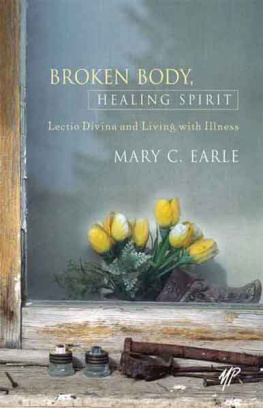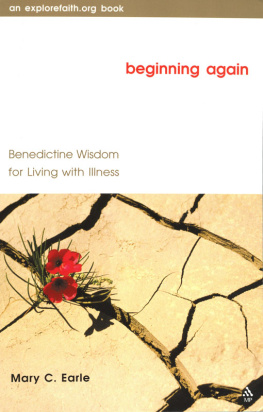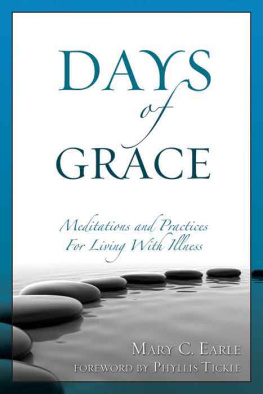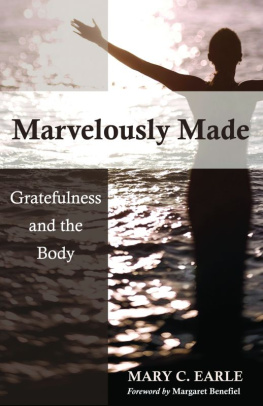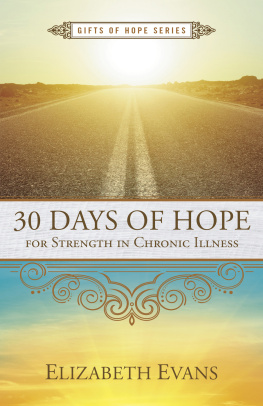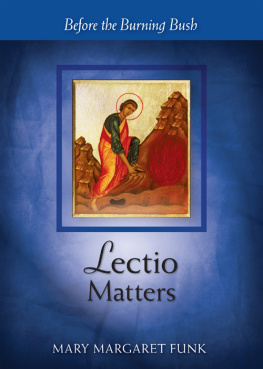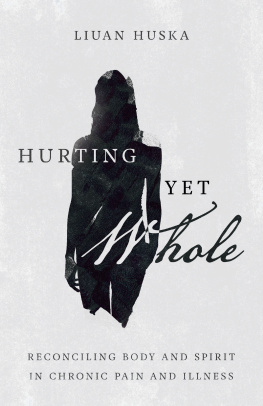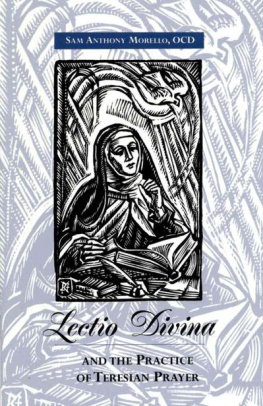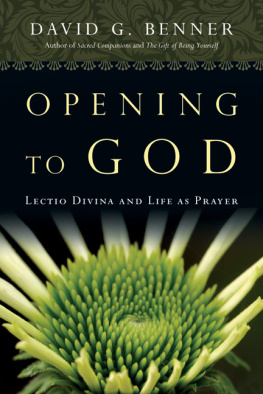I am particularly grateful to Susan Hanson for her reading of the manuscript and for her good critique, and to Debra Farrington and Nancy Fitzgerald for their editorial skill. I also thank the members of the several classes I have offered on living with illness at St. Marks Episcopal Church in San Antonio and at the Episcopal Seminary of the Southwest in Austin. Their insight, wisdom, and courage were invaluable in the crafting of this text. The Reverend Michael Chalk, rector of St. Marks, has offered support and encouragement for the vocation of writing, a gift beyond measure. Sylvia Maddox provided the impetus for this book through her insistence that I write about what I have learned. My husband Doug has been a steadfast companion, in sickness and in health; he knew the book was ready for writing before I did.
Portions of this text appeared as an article, Reading the Text of an Illness, in Presence: The Journal for Spiritual Directors International, vol. 6, no. 1, January 2000, 711.
If you are living with illness, be mindful of your own physical, emotional, and spiritual limitations as you read this book and engage the suggested practices of prayer. Go at your own pace. If you have questions about the appropriateness of a practice for your own condition, check with a doctor, spiritual director, or other caregiver.
CHAPTER 1
Introduction

In the summer of 1995,1 had just returned from a vacation in northern California. Feeling well and relaxed from my time away, I had no idea that an attack of acute pancreatitis was about to change my life completely. The Sunday prior to the attack, I felt fine. I went about my regular duties as a parish priest. On Monday, after having breakfast and sending my husband off to work, I became violently ill, so ill that I could barely make it to the telephone. A ride in an ambulance followed, then a hospitalization. Months of snail-slow recovery ensued. Then there was yet another attack and hospitalization and even more months of recovery.
Throughout all of this I discovered what everyone who suffers from illness in its acute, chronic, or progressive forms eventually learns: being sick rudely interrupts life as you know it. Plans, hopes, dreamseverything from trips abroad to new employment to advanced college degrees to enjoyment of grandchildren all go by the wayside. Life changes color, tone, and texture. You make the acquaintance of something that is other, something that lives within the housing of your body. Illness forces you to inhabit a reality that our culture rejects completely, a reality marked by real limitation, physical frailty, and a variety of constraints that curtail your activities.
In the hospital following my first attack, friends, parishioners, and fellow clergy came to see me, and rare was the visitor who didnt come with an interpretationalmost all unhelpfulof my illness. My visitors offered me a variety of ways to read the text of my illness, ranging from the pseudo-Christian proclamation that God must want you to be a saint (sadly not said in jest) to the kind of remark that contemporary spirituality writer Joan Borysenko calls New Age fundamentalism. In my case this New Age fundamentalism looked like the literal reading of the body, equating each malady or each organ with a particular affliction of the spirit. Since my pancreas was the afflicted organ, I was told that I didnt have enough sweetness in my life, presumably because the pancreas, in its creation of insulin, regulates blood sugar levels.
At a time when I was at my most vulnerable, I found myself besieged with others opinions and interpretations. I was surprised by the avalanche of unsolicited advice. I was overwhelmed by so many notions of the meaning of the experience of falling acutely ill. So in the long months of recovery, I began to search for a way to read my illness and my body on my own. I wanted to allow myselfand other people like methe chance to study the narrative, or the story, of what had happened, and to bring that narrative into prayer and reflection. The quick and ready interpretations that are so often handed to someone who is ill overlook the specific reality of each person, and the particular experience of being sick and weakened.
If youve lived with illness, you know exactly what its like when other people so readily interpret your experience. But you have the capacity, with support, to interpret it yourself, letting the experience become a sacred text, a life narrative full of meaningeven if the meaning is veiled, even if your plans are interrupted, even if you live in wrenching pain. Your body may be full of clues about what this illness means in your life, clues that shouldnt be met with formulaic responses that stop your story before it is told. The text of your illness is embedded within the text of your lifeyour particular life with your own particular questions, hopes, dreams, griefs, and aspirations.
READING THE TEXT
As I recovered from my attacks and pondered how to re-vision my illness and my life, I realized that one of my own prayer practices could help me. For years the practice of lectio divina, or sacred reading, has fed my spiritual life. Why couldnt it nourish the life and spirit of my body as well?
In the late 1970s a friend lent me audiotapes of a retreat led by the Reverend Mark Dyer, who later became the bishop of the Episcopal Diocese of Bethlehem, Pennsylvania. On those tapes, he introduced the Benedictine practice of lectio divina, a way of reading and praying Scripture. I clearly remember standing in the kitchen, chopping vegetables for salad while listening as he spoke of this way of praying. As I went about the ordinary activity of preparing dinner, his voice described the activity of regularly engaging Scripture with an open heart. I stood in the space so regularly inhabited by my family, and it began to dawn on me that this way of praying was intended for those who were not experts.

